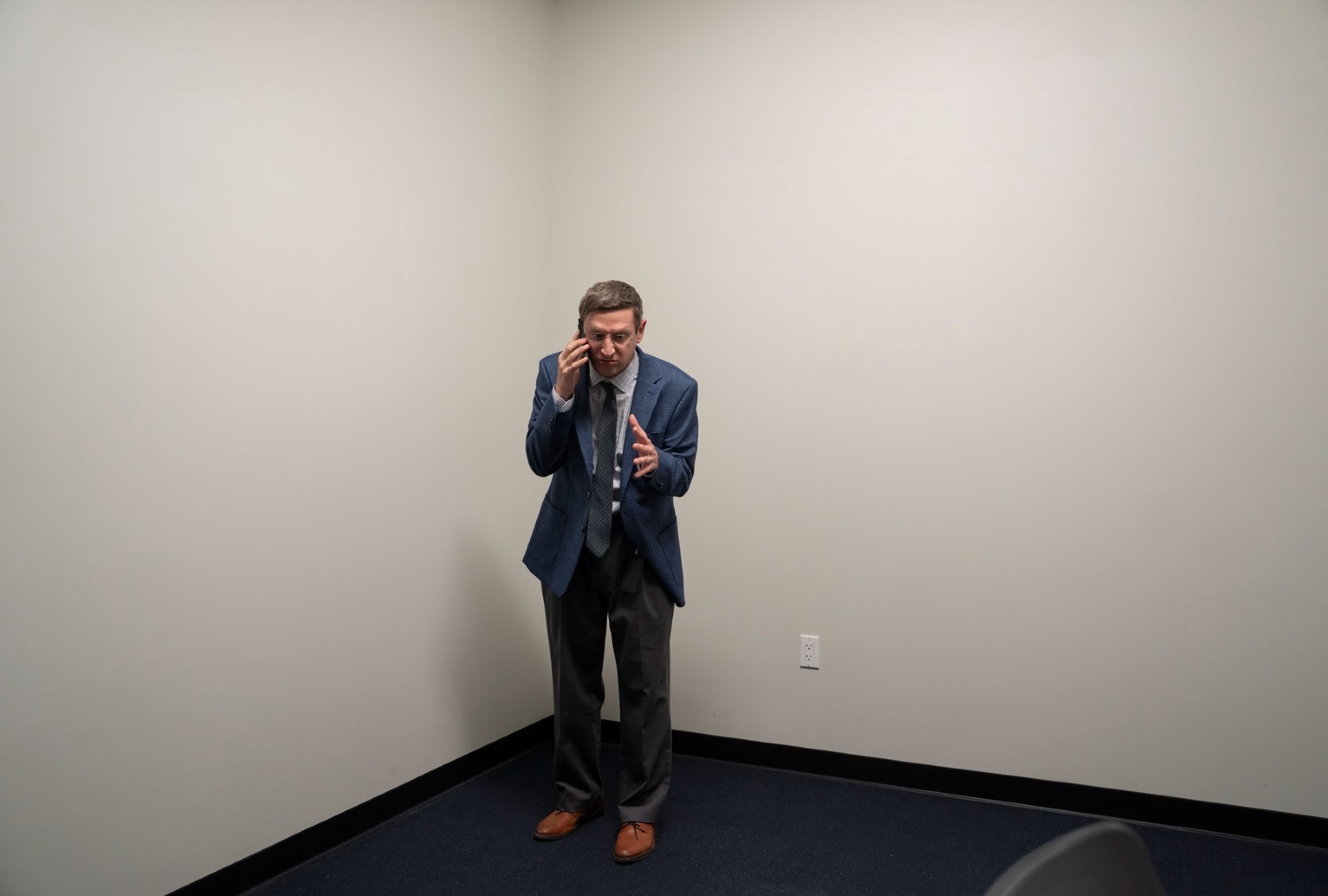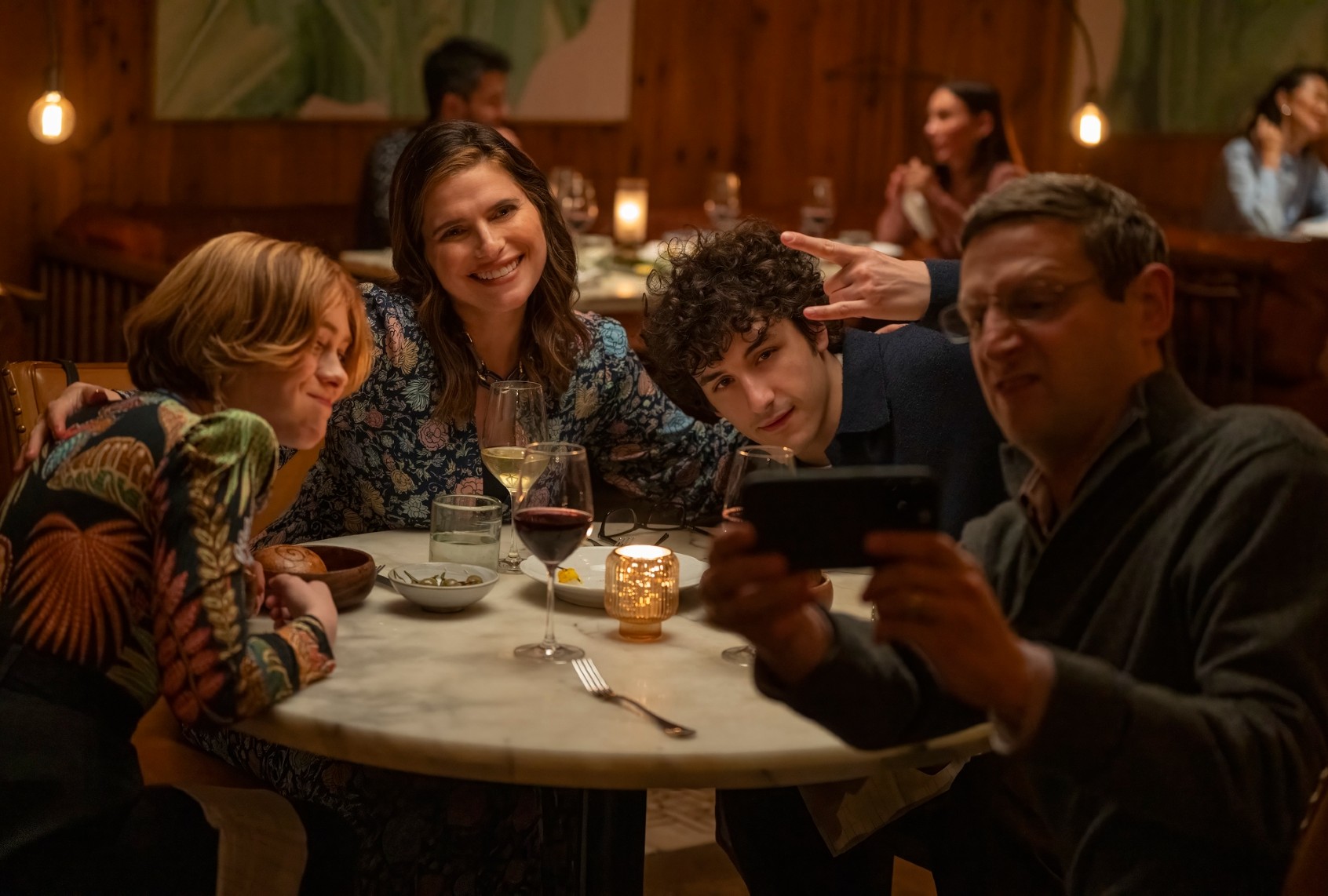[ad_1]
Recently, I read an analysis of why so many otherwise sane-seeming people find themselves drawn to QAnon and other mass delusions. The writer pointed to the standard empirical data points – consumer confidence, morale, the usuals – but eventually landed on the basic plausible theory that chasing down conspiracies is just plain fun.
When the conspiracy at the center of “The Chair Company” consumes the life of Ron Trosper, he vacillates between screaming fury and the type of validation that lights up his smile from the inside. Ron is the type of man Tim Robinson utilizes throughout his and Zach Kanin’s three-season sketch adventure “I Think You Should Leave” – that is, a stable and probably dull guy who may have too much going for him.
“The Chair Company” is an endurance test. If that sounds unpleasant, you may not be cut out for Robinson’s brand of comedy.
It only takes one slip or an aggressive clown’s ego assault to send him into a screeching frenzy, to make him press the gas to the ground in a zone where the speed limit is 25 miles per hour, to lose everything while chasing a villain that may be imaginary. Some scenes introduce that character as the straight man. In others, he’s an imp hiding within an ill-fitting costume of normalcy.
This comedy allows Robinson to play both in the guise of a mall development firm’s middle manager, a position that makes him both a very big deal and a dinosaur who arrives at the top of the food chain shortly before an extinction event.

(Sarah Shatz/HBO) Tim Robinson as William Ronald Trosper in “The Chair Company”
Ron lives and works in Ohio, a place enveloped in a galaxy of beiges and inoffensive cool tones. Against this backdrop, his boss Jeff Levjman (Lou Diamond Phillips) looks sophisticated and urbane, but that may be the product of surrounding himself with kiss-ups and low-key crackpots like Ron and the co-workers who annoy him.
Regardless of how you view Ron’s job or happy hour excursions, his life seems enviable. His wife, Barb (Lake Bell), adores him. His daughter, Natalie (Sophia Lillis), is on the verge of getting married. His dopey teen son, Seth (Will Price), doesn’t hate him. Ron even scores a promotion at work, placing him in charge of his company’s next major retail development and overseeing a team that seems to respect him.
Until life drops a banana peel in his path.
“The Chair Company” is an endurance test. If that sounds unpleasant, you may not be cut out for Robinson’s brand of comedy. But those who are familiar with and enjoy Robinson’s puckering brand of cringe are probably up for the challenge — which it is, in the best way.
Any viewer thoroughly marinated in the pungent weirdness of “I Think You Should Leave” understands what that means. Robinson and Kanin find a conceit, whether it’s a sight gag or a scenario, and keep escalating the ridiculousness of it well past the standard threshold of appropriateness. These guys commit to a bit, and commit, and commit, and overcommit and keep on going. But even if a sketch doesn’t quite work, you could rest in knowing its discomfort is temporary, with the irritant or foolishness changing every few minutes.
Where “I Think You Should Leave” operates like a jukebox, “The Chair Company” is a concept album extrapolating a single sight gag into a swirl of lunacy on par with an extended free jazz performance. Sometimes Robinson’s truth seeker is the man anchoring the beat, and sometimes he’s the instrumentalist testing the edges of what the audience can withstand. It’s the crazy wall TV trope realized as a situational comedy, originating from a single pinpoint of Ron’s inability to let go of the smallest slights.
That idea starts with HBO’s request to keep the reason the show is called “The Chair Company” under wraps. Reviewers generally find spoiler definitions of that caliber a little precious. Here, though, it’s justified because what befalls Ron could happen to anyone, and rooting surreal situations in relatability sparks Robinson’s comedy. Then, as always, the performer violates that sympathy by taking Ron’s reactions a few steps beyond too far. Once he pursues a resolution and is denied, the bolts start popping off the plane mid-flight.
“The Chair Company” allows us to see how anyone might fall down the chutes into which Robinson’s Joe Average easily slides. Poking around the Internet allows Ron to rationalize his way into impossible answers. There is no dead end that isn’t obscuring some secret hatch or hidden door revealed by doing his own research. Ron’s career casts him as a cog in the grand machinery of consumerism. Not even a server at the celebratory restaurant dinner that opens the series views what he does as especially important or relevant in this day and age.

(Virginia Sherwood/HBO) Sophia Lillis, Lake Bell, Will Price and Tim Robinson in “The Chair Company”
Thus, we can understand why, later in the season, when he confesses to someone he can trust, “I’m doing something that’s beyond what anybody could ever dream of . . . I’m uncovering a vast criminal conspiracy,” we’re right there with that person as they embrace him supportively. His hunger for meaning is palpable, so loved ones can either stand by his side or lose Ron entirely to this nonsensical mission.
Since we remain with Ron for eight episodes, we understand how much he has to lose. That part is clear as soon as Ron exits his front door each morning. Robinson and Kanin treat comedy similarly to how the Army irradiated part of the Nevada desert with hundreds of nuclear explosions: No interaction is too minor to dement.
There are many scenes where Robinson abandons his jittery schtick to allow Ron’s frustration and hangdog fatigue with his life to guide them, anchoring the absurdity in Robinson’s naturalistic charm.
Ron’s quest lurches and retreats often enough for the audience and Robinson’s hero to wonder whether he’ll be able to land this thing safely without destroying his safe Midwestern life.
Robinson and Kanin are smart to ensure the two sides aren’t starkly misaligned, and the star employs a variety of shades in his performance. Screaming and gesticulating wildly is Robinson’s signature. Those who only know Robinson from his work with Sam Richardson in “Detroiters” might even find the first episode stressful. But once you acquire this taste, you’ll eventually find his scythe-edged humor and tension hysterical.
Start your day with essential news from Salon.
Sign up for our free morning newsletter, Crash Course.
There are many scenes where Robinson abandons his jittery schtick to allow Ron’s frustration and hangdog fatigue with his life to guide them, anchoring the absurdity in Robinson’s naturalistic charm. (It has that in common with “Friendship” as well as director Andrew DeYoung, who divides the task of directing episodes with Aaron Schimberg.)
For all its familiar eccentricity, “The Chair Company” is ultimately a satisfying exercise of give-and-take, with Robinson empowering his costars to draw us into their squeamishness and oddity as frequently as his everyman stampedes through his. Ron’s odyssey is preposterous, and his passion for seeing it through is deliriously outsized. But there’s never a moment that isn’t a good time. These days, that’s all many of us want — to be part of something exciting that most people don’t quite get. But falling for this is a whole lot safer.
“The Chair Company” airs at 10 p.m. Sundays on HBO and streams on HBO Max.
Read more
about this topic
[ad_2]
